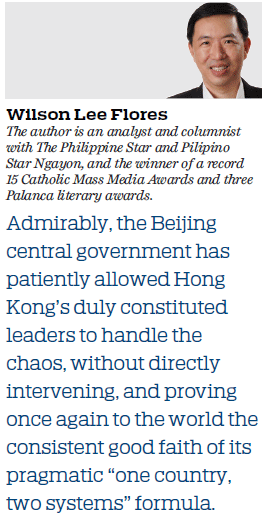Peaceful HK election is a victory for 'one country, two systems'
Updated: 2019-12-02 08:11
By Wilson Lee Flores(HK Edition)
|
|||||||
While not a few tendentious Western politicos and media - which for the past five months have been overtly supporting anti-government protesters and not condemning violent rioters - are feverishly crowing about the win of "pan-democrat" candidates in Hong Kong's District Council elections, I have a bigger-picture and sober perspective: The peaceful, efficient and high-turnout election is ultimately a clear victory for "one country, two systems" and a chance for the city's long-term social peace.
Instead of delving into the protest votes in the district elections unduly influenced by high emotions of the months of political unrest, decades of unresolved domestic socioeconomic ills and flagrant encouragements by foreign political forces, let me share some wise reminders from two great leaders of the West and East cautioning us about popularity polls.
The humanist leader and scientific genius Albert Einstein said: "What is right is not always popular, and what is popular is not always right."

In his classic book The Singapore Story: Memoirs of Lee Kuan Yew, the late, great Singaporean statesman Lee Kuan Yew said: "I have never been over concerned or obsessed with opinion polls or popularity polls. I think a leader who is, is a weak leader. Between being loved and being feared, I have always believed Machiavelli was right. If nobody is afraid of me, I'm meaningless."
The Hong Kong government and police maintained maximum restraint and allowed the election to proceed despite numerous provocations and unprecedented destructive anarchy by rioters in the weeks leading up to the polls. Contrary to the barrage of fake news by radical protesters and their foreign sympathizers unfairly defaming the Hong Kong government and the courageous police, it is my reckoning that the Hong Kong government had in fact been far too lenient and inordinately tolerant of the rioters' savage lawlessness. Any country in the West or other regions would have already harshly crushed the violent protests with the full force of the law.
I share the belief of Singapore's late founding father, Lee Kuan Yew, who publicly said in Hong Kong in 2005 that the city needed a "street fighter" chief executive to avoid mass confrontations. He commented on the then-outgoing chief executive, Tung Chee-hwa: "Mr Tung was too nice a man, not sufficiently young and nimble. He wasn't a street fighter. In the Hong Kong situation, with people out in the streets, you want a street fighter. Then you can avoid this kind of confrontation," a reference to the 2003 and 2004 mass protests.
Admirably, the Beijing central government has patiently allowed Hong Kong's duly constituted leaders to handle the chaos, without directly intervening, and proving once again to the world the consistent good faith of its pragmatic "one country, two systems" formula.
The smooth District Council elections offer genuine hope for Hong Kong's long-term peace, for positive multi-sectoral dialogues, bold socioeconomic reforms, rebuilding infrastructures and rejuvenating damaged business confidence. Instead of becoming mired in the quicksand of toxic politics, different sectors should now ideally focus more on social and economic reforms to restructure, reinvent and renew Hong Kong.
The city's leaders and various sectors should also dispassionately evaluate its strategic relevance and future in a fast-changing world. What shall be Hong Kong's role in the booming Guangdong-Hong Kong-Macao Greater Bay Area, which includes all cities of the Pearl River Delta and collectively represents 26 percent of all mainland trade?
Almost similar to the Chinese mainland's successful grassroots village elections of leaders in its unique, cohesive and stable political system, which I would like to describe as "democracy with Chinese characteristics", the Hong Kong Special Administrative Region's District Council elections are designed with the goal of upholding political inclusiveness in grassroots governance across the city's 18 districts.
Hong Kong's elected district officials have responsibilities that cover diverse day-to-day community concerns such as livelihood, transportation, environment, living conditions, etc. Can they rise above partisan politics to fulfill their main duties to ensure the city's continued progress?
The recent district election is a watershed for Hong Kong, a possible robust and optimistic new beginning for this resilient city of talented and hardworking people. The bottom line is that Hong Kong continues to retain all of its unique economic, legal and other strengths; its people have withstood the tempest of civic unrest with stoic courage; and Beijing has repeatedly reaffirmed its iron-clad commitment to support this dynamic autonomous territory and its leaders.
(HK Edition 12/02/2019 page8)